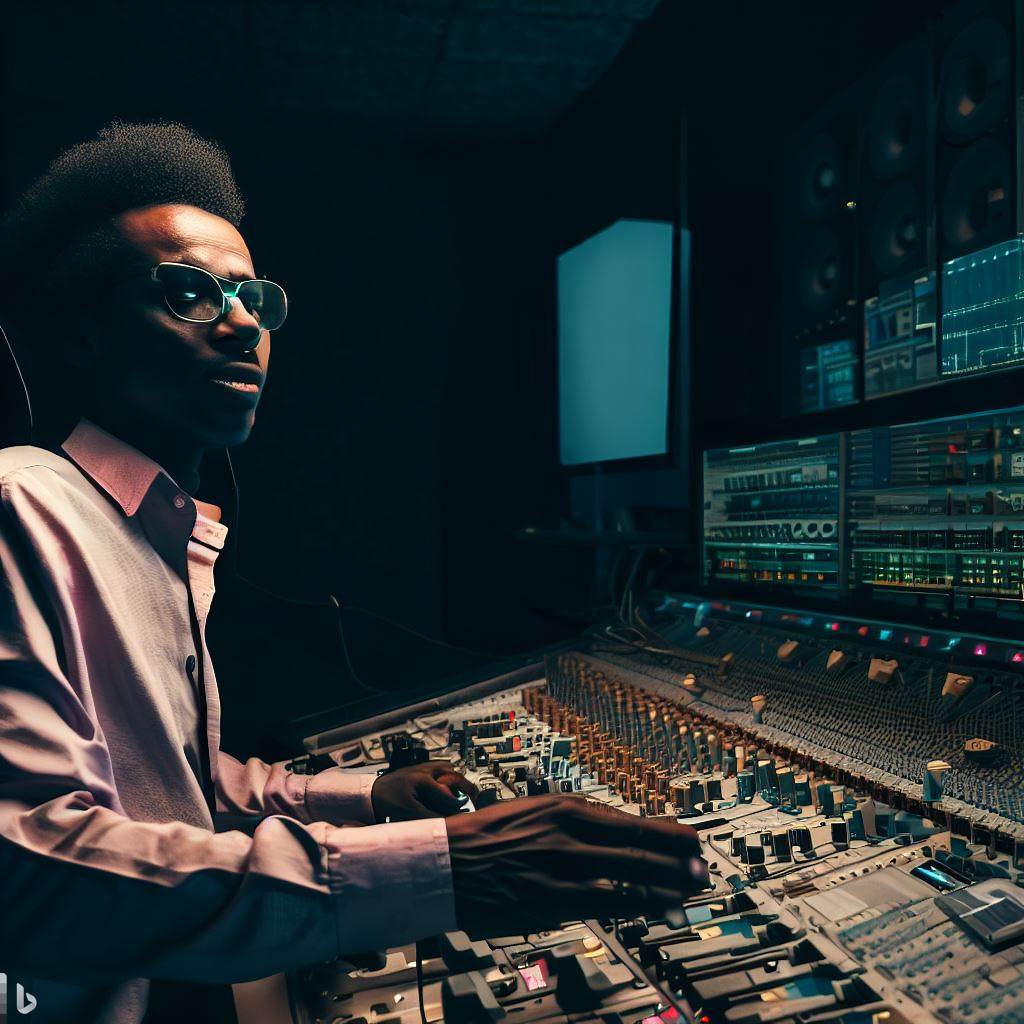Introduction
Nigerian Mixing Engineer Skills are pivotal in crafting and perfecting song or album soundscapes in music production.
These individuals possess a set of key skills that are essential for their success in the industry.
The importance of these skills cannot be overstated, as they directly impact the overall quality and appeal of the music being produced.
A successful Nigerian mixing engineer must possess these key skills to ensure that they are able to deliver high-quality and polished tracks that meet the expectations of both artists and listeners alike.
By mastering these skills, a mixing engineer is able to bring out the best in a song, balancing and blending various elements such as vocals, instruments, and effects to create a harmonious and pleasing mix.
The ability to do so requires a deep understanding of music theory, technical proficiency with audio editing software, and an ear for detail.
Additionally, a successful Nigerian mixing engineer must have excellent communication skills and the ability to work collaboratively with artists, producers, and other members of the production team.
This ensures that the final product aligns with the artistic vision and goals of the project.
In the end, the key skills possessed by a successful Nigerian mixing engineer are vital for their ability to create outstanding and commercially successful music.
These skills enable them to enhance the sound of a song, showcasing their technical prowess, creativity, and understanding of the artist’s vision.
Technical Skills
Specific technical skills that every successful mixing engineer should possess
- A successful mixing engineer should possess specific technical skills to excel in their profession.
- A deep understanding of audio equipment, software, and sound engineering techniques is essential.
- Knowledge of signal processing techniques is crucial for creating high-quality mixes.
- Equalization skills play a vital role in achieving a balanced and professional sound.
- Having a grasp of pitch correction techniques can enhance the overall quality of recordings.
- Proficiency in utilizing audio effects such as reverb, delay, and compression is necessary.
The importance of having a deep understanding of audio equipment, software, and sound engineering techniques
- Understanding the fundamentals of digital audio workstations (DAWs) is essential for seamless mixing.
- Being able to manipulate and control audio levels is crucial for achieving clarity and dynamics.
- Knowledge of stereo and surround sound techniques enables the engineer to create immersive mixes.
- Practical experience with different types of microphones helps in achieving the desired sound capture.
- Being proficient in editing techniques allows the engineer to polish and modify recordings effectively.
- Understanding the principles of sound and acoustics aids in locating and correcting potential issues.
- Proficiency in using plugins and virtual instruments enhances the creativity and versatility of mixes.
- Knowledge of audio file formats and conversion techniques ensures compatibility with various platforms.
- Experience with recording techniques allows the engineer to optimize the sound quality from the source.
Examples of technical skills such as signal processing, equalization, and pitch correction
- A successful mixing engineer should possess collaboration and communication skills to effectively work with clients and artists.
- Strong organizational skills help in efficiently managing large projects with multiple tracks and files.
- Being up-to-date with the latest advancements in audio technology is crucial for staying competitive.
- Analytical listening skills enable the engineer to discern and address any audio imperfections.
- An ability to troubleshoot technical issues efficiently is essential for a smooth mixing process.
- Effective time management skills ensure that projects are completed within the specified deadlines.
Read: Nurturing Talent: The Role of Mentorship in Mixing Engineering in Nigeria
Creativity and Innovation
In the field of mixing engineering, creativity and innovation play a significant role.
As a mixing engineer, it is crucial to bring unique ideas and perspectives to the mixing process.
Creativity and innovation are essential skills for a successful Nigerian mixing engineer.
These skills allow them to go beyond traditional mixing techniques and create unique and outstanding mixes.
Significance of creativity and innovation in the field of mixing engineering
As a mixing engineer, being creative means having the ability to bring new and fresh ideas to the table.
It means thinking outside the box and pushing the boundaries of what is considered the norm.
Creativity allows a mixing engineer to experiment with different sounds, textures, and effects to create a one-of-a-kind mix that stands out from the crowd.
Innovation is equally important in the field of mixing engineering. It involves being open to new ideas and approaches, constantly learning and growing, and staying updated with the latest trends and technology.
An innovative mixing engineer can adapt to the ever-evolving music industry and incorporate new techniques and tools into their workflow.
The ability to bring unique ideas and perspectives to the mixing process
Bringing unique ideas and perspectives to the mixing process is crucial for a successful Nigerian mixing engineer.
It sets them apart from others and helps create a signature sound that artists and producers seek.
By bringing their own artistic vision and interpretation to a mix, a mixing engineer can add a distinct flavor and personality to the music.
Importance of thinking outside the box and adapting to various genres and music styles
Thinking outside the box is an essential skill for a mixing engineer. It allows them to break free from conventions and explore unconventional approaches to mixing.
It gives them the freedom to experiment, take risks, and try new things.
By thinking outside the box, a mixing engineer can come up with inventive ways to blend different genres and music styles, creating fresh and exciting mixes.
Adapting to various genres and music styles is another critical aspect of being a successful Nigerian mixing engineer.
Different genres require different approaches and techniques to bring out the best in the music.
A skilled mixing engineer should be versatile and adaptable, able to cater to the specific needs and aesthetics of each genre.
This ability to adapt ensures that the mix complements the overall vibe and style of the music.
In fact, creativity and innovation are vital skills for every successful Nigerian mixing engineer.
These skills enable them to bring unique ideas and perspectives to the mixing process, think outside the box, and adapt to various genres and music styles.
By honing these skills, a mixing engineer can deliver exceptional and unforgettable mixes that leave a lasting impact.
Read: Internationally Recognized Nigerian Mixing Engineers: A Profile
Attention to Detail and Accuracy
Necessity of having a keen attention to detail in order to ensure accurate and high-quality mixing
In the world of mixing engineering, attention to detail is a paramount skill that separates successful professionals from the rest.
It is the ability to meticulously listen, analyze, and correct every aspect of an audio track.
By paying close attention to the tiniest details, a mixing engineer ensures an accurate and high-quality mix.
The ability to identify and correct any imperfections, inconsistencies, or technical issues in the audio tracks
A mixing engineer with a keen attention to detail can spot imperfections, inconsistencies, or technical glitches in audio tracks.
They possess a trained ear and are able to identify problems like noise, clicks, pops, or timing issues that may arise during recording.
They have the technical knowledge and experience to rectify these problems effectively.
Importance of delivering well-balanced and polished mixes to meet client expectations
A successful Nigerian mixing engineer understands the importance of delivering well-balanced and polished mixes to meet client expectations.
They know that a mix should sound clear, coherent, and professional across different playback systems.
By using their attention to detail, they ensure that each instrument and element in the mix is appropriately balanced and enhances the overall sonic experience.
Essential Skills for Nigerian Mixing Engineers
- Technical Proficiency: A successful mixing engineer should possess a strong technical knowledge of audio equipment, software, and signal flow.
They should be proficient in using digital audio workstations (DAWs), plugins, and various hardware devices. - Musicality: Apart from technical skills, a mixing engineer needs to have a good sense of musicality.
They should understand different genres, musical dynamics, and how various instruments and elements interact with each other. - Good Communication: Strong communication skills are essential for a Nigerian mixing engineer.
They should be able to understand and interpret clients’ requirements accurately, as well as effectively communicate their creative choices and suggestions to artists, producers, and other stakeholders involved in the project. - Problem-Solving: The ability to analyze and solve technical and sonic problems is crucial in the realm of mixing engineering.
- Time Management: Mixing engineers should have excellent time management skills to ensure timely delivery of high-quality mixes without compromising on the attention to detail.
- Continuous Learning: The field of audio engineering is ever-evolving, with new techniques, technologies, and trends being introduced regularly.
- Professionalism: Lastly, professionalism is key for any mixing engineer. They should prioritize client satisfaction, be reliable, and maintain a positive attitude throughout the mixing process.
In essence, a successful Nigerian mixing engineer should possess a keen attention to detail and accuracy.
By identifying and rectifying imperfections, inconsistencies, and technical issues, they deliver well-balanced and polished mixes that meet client expectations.
Combined with essential skills such as technical proficiency, musicality, good communication, problem-solving abilities, time management, continuous learning, and professionalism, these attention to detail and accuracy skills contribute to a successful career in the field of mixing engineering.
Read: How Nigerian Journalists are Shaping Policy

Communication and Collaboration
Communication and collaboration are vital for a successful Nigerian mixing engineer.
These skills are crucial in working with musicians, producers, and other industry professionals.
Effective communication is essential for understanding the client’s vision and translating it into the final mix.
Additionally, cultivating positive and professional relationships with clients ensures repeat business.
Importance of effective communication skills in collaborating with musicians, producers, and other industry professionals
Good communication skills are pivotal for a mixing engineer to collaborate effectively with musicians, producers, and other industry professionals.
Being able to clearly express ideas, concerns, and expectations with individuals in the music industry is crucial for a successful career.
Without effective communication, misunderstandings can occur, leading to project delays, budget overruns, and unsatisfied clients.
The ability to understand and translate the clients’ vision into the final mix
Understanding and translating the client’s vision into the final mix is a key responsibility of a mixing engineer.
This requires active listening, empathy, and the ability to interpret the client’s preferences and desires.
By actively engaging with the client and paying close attention to their needs, a mixing engineer can create a mix that aligns with the client’s artistic vision.
The importance of cultivating positive and professional relationships with clients to ensure repeat business
In addition to communication and translation skills, building positive and professional relationships with clients is essential.
Repeat business is crucial for a Nigerian mixing engineer’s success, and it is often achieved through referrals and recommendations from satisfied clients.
By cultivating trust, respect, and open communication with clients, a mixing engineer can foster long-term collaborations and secure future projects.
Enhancing communication and collaboration skills
To enhance communication and collaboration skills, a Nigerian mixing engineer can consider the following:
- Active Listening: Pay close attention to clients’ needs, preferences, and feedback. Actively listen to their suggestions and incorporate them into the mixing process.
- Clarity in Communication: Clearly articulate ideas, concerns, and expectations with musicians, producers, and other industry professionals. Use concise and direct language to avoid misunderstandings.
- Technical Proficiency: Stay updated with the latest mixing techniques and software to effectively communicate with clients and other industry professionals. Being knowledgeable and skilled in using the tools of the trade is essential for effective collaboration.
- Adaptability: Every project and client is unique. Being adaptable and flexible in adjusting to different creative preferences and working styles is essential for successful collaborations.
- Professionalism: Maintain a high level of professionalism in all interactions with clients. Respond promptly to emails and phone calls, deliver projects on time, and handle conflicts or disagreements with grace and professionalism.
- Building Trust: Establish trust with clients by delivering high-quality mixes, respecting their creative input, and maintaining confidentiality. Trust is the foundation of successful collaborations and repeat business.
- Networking: Actively engage in networking events, conferences, and online platforms to connect with musicians, producers, and other industry professionals. Building a strong network can lead to new collaborations and opportunities.
Basically, communication and collaboration play a crucial role in the success of a Nigerian mixing engineer.
The ability to effectively communicate with clients, understand their vision, and collaborate with industry professionals is essential for delivering exceptional mixes and securing repeat business.
By continuously honing communication skills, cultivating positive relationships, and staying updated with industry trends, a Nigerian mixing engineer can thrive in the competitive music industry.
Read: Mixing Engineer Contracts: Legal Aspects in the Nigerian Context
Time Management and Organization
Time management and organization are crucial skills for every successful Nigerian mixing engineer.
Efficient Time Management
Being able to manage time efficiently and meet project deadlines is essential for a mixing engineer.
Time is of the essence in the fast-paced music industry, and meeting deadlines is crucial for career growth and client satisfaction.
Handling Multiple Projects
A successful mixing engineer should have the ability to handle multiple projects simultaneously.
With various clients and assignments, it is important to prioritize tasks accordingly, ensuring that each project receives the attention it deserves.
Prioritizing Tasks
Prioritizing tasks is the key to effective project management.
By understanding the importance of each task, a mixing engineer can allocate time and resources accordingly, ensuring that the most critical aspects are given priority.
Organized Workflow
Maintaining an organized workflow is essential to avoid confusion and ensure smooth project execution.
An organized workflow allows for efficient communication, collaboration, and seamless transitions from one stage to another.
File Management System
Along with an organized workflow, a successful mixing engineer should have a reliable file management system.
This involves naming conventions, folder structures, and data backup strategies to ensure quick access and data security.
Efficient Communication
Clear and efficient communication is vital for successful collaboration with clients, artists, and other professionals involved in the music production process.
A mixing engineer needs to articulate ideas, listen actively, and provide constructive feedback.
Attention to Detail
A successful mixing engineer pays attention to even the smallest details.
Every track, instrument, and effect should be meticulously balanced, enhancing the overall sound quality and delivering a polished final product.
Technical Proficiency
Having a strong foundation in technical skills is necessary for any mixing engineer.
Knowledge of various digital audio workstations (DAWs), plugins, and audio processing techniques allows for creativity and versatility in sound production.
Continuous Learning
A successful mixing engineer should never stop learning. The music industry evolves rapidly, and staying updated with the latest techniques, trends, and tools is crucial for maintaining a competitive edge.
Flexibility and Adaptability
Adapting to different genres, styles, and client preferences is a skill that sets a successful mixing engineer apart.
Being flexible and adaptable allows for versatility and the ability to cater to a wide range of musical projects.
Problem-Solving Abilities
When faced with technical issues or creative challenges, a successful mixing engineer should possess problem-solving abilities.
Finding innovative solutions and troubleshooting efficiently ensures a smooth workflow and client satisfaction.
Publish Your Professional Profile, Business or Brand
Showcase your expertise, gain trust, and boost visibility instantly on Professions.ng.
Publish NowPassion and Dedication
A genuine passion for music and dedication to the craft are indispensable qualities for a successful mixing engineer. The love for creating the best possible sounds drives continuous improvement and excellence.
All in all, a successful Nigerian mixing engineer should possess a combination of time management, organization, technical proficiency, and interpersonal skills.
These skills, along with a passion for music and a dedication to the craft, will enable the engineer to thrive in the dynamic and competitive music industry.
Learn More: How to Navigate the Nigerian Performance Art Scene
Conclusion
The key skills discussed in this blog post for a successful Nigerian mixing engineer include technical expertise, attention to detail, good communication, creativity, and collaboration.
These skills are crucial for creating high-quality and appealing mixes that meet clients’ expectations.
It is important for aspiring mixing engineers in Nigeria to develop and improve these skills in order to excel in their careers.
By continuously working on their technical knowledge, paying attention to minor details, effectively communicating with clients, bringing creativity to their work, and collaborating with others, they can stand out in the industry and deliver exceptional results.
The demand for skilled mixing engineers in Nigeria is growing, and possessing these key skills can open up various opportunities for success.
As technology continues to advance, it is also essential for mixing engineers to stay updated with the latest tools and techniques in the field.
Mastering these key skills is not only beneficial for individual career growth but also contributes to the overall growth of the Nigerian music industry.
By consistently honing these skills, aspiring mixing engineers can make significant contributions to the success of artists and the industry as a whole.




